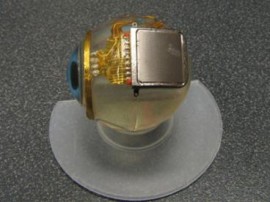
Lucky are those who have clearer eyesight because they are able to see the real beauty of God’s creations. Thus, varying colors handled by every object can be expressed into its complete details such as the color, size, and shape.
Seeing things all around you could be normal for most people. But behind the eyes of a blind person, everything will just walk around their imagination.
Eric Selby, a retired engineer in Coventry, Central England, relates himself as someone who had been totally blind for two decades. HE had no one to get around except for his dog serving as his guide for years.
However, when an artificial retina was placed in his eye, he was able to detect common things along his surroundings.
Selby. 68, had the chance to have an artificial implant surgically put into his right eye more than a year ago. It was called as the Argus II which was made by the US based company Second Sight.
The said implant has a small video camera, transmitter in a pair of gl(–foul word(s) removed–) along with the small wireless computer.
The camera captures the scene and is processed by the computer and is then converted into visual information in the form of electronic signal carried to the implant. It stimulates the healthy cells remaining in the retina so that optic nerves will receive and carry the data.
The brain receives the visual information that was converted into light patterns that determines the object’s features. It is needed that patients must be familiar with its functions. The mentioned implant is basically for those who still have working optic nerves and had been able to see things in the early stages of their lives.
Some problems like retinitis pigmentosa are just inherited. An estimated number of 3,000 can avail the benefits of the artificial retina with the price of $100,000.
Since 2006, there are about 40 people who have availed the benefits of the artificial retina. Positive outcomes like identifying objects and reading texts with large fonts during trial participations are being conducted to them.
Retinal implant projects are presently competing worldwide. Researchers are ongoing regarding such. Still, its effectiveness will depend on the amount and quality of the remaining retinal cells.
In the future, further studies and developments conducted by the experts will eventually restore or improve human sight.
